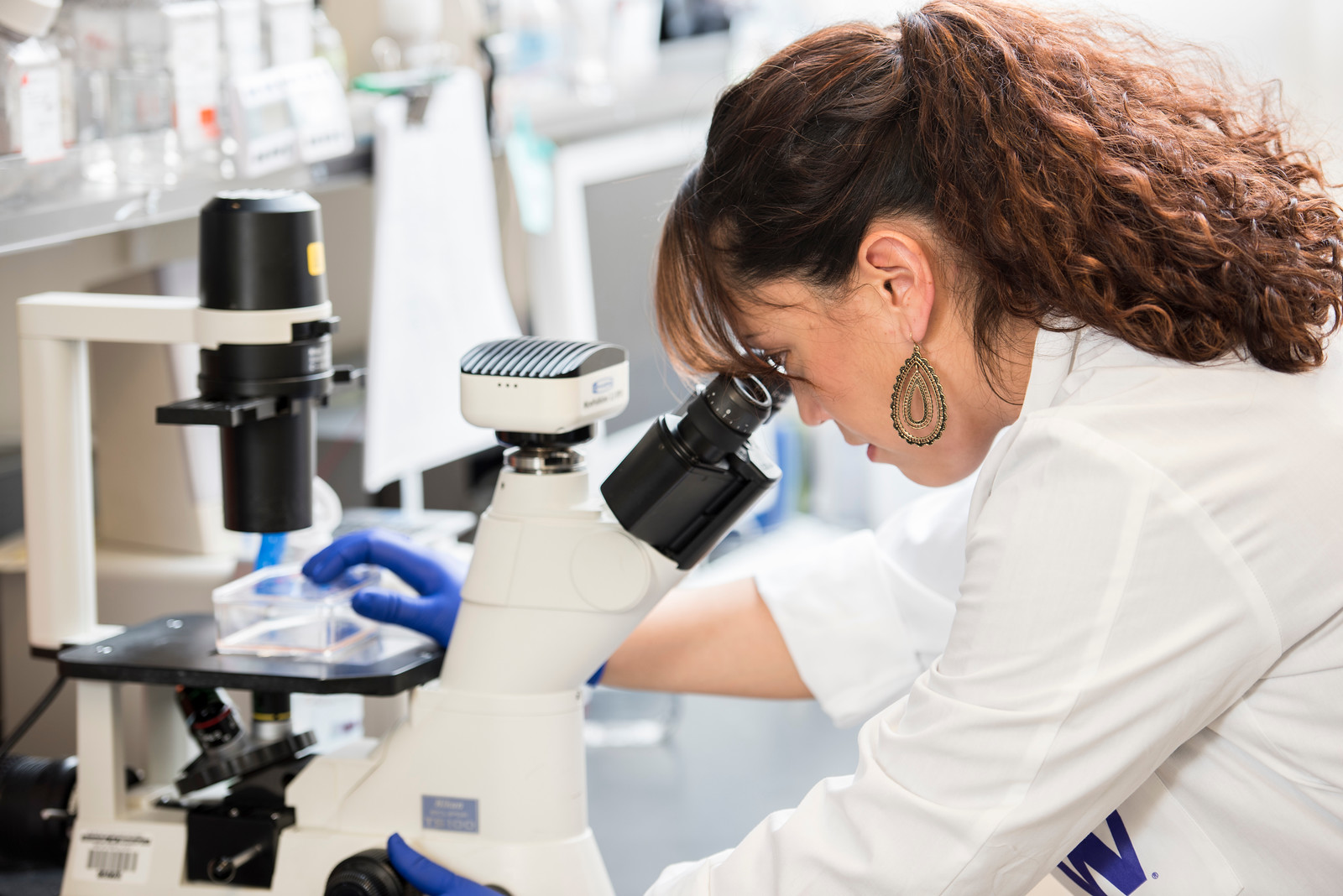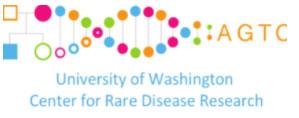How we work
The Consortium includes five Research Centers, a Data Coordinating Center, National Human Genome Research Institute (NHGRI) within the National Institutes of Health (NIH) program staff, and other collaborators and research groups studying the genomics of rare diseases who wish to become partner members.
Collaboration is a primary theme and will be part of our work in many ways including data sharing within both the GREGoR Consortium and the broader community; Working Groups including members from each Research Center; and exploring innovative partnerships. Outreach, education and advocacy are critical as we learn new ways to solve Mendelian diseases and develop new tools and creative methods that we can share with the broader scientific community.

How we are funded - NHGRI
The GREGoR Consortium is funded by the National Human Genome Research Institute (NHGRI) within the National Institutes of Health (NIH). Established in 1989, NHGRI collaborates with scientific and medical communities to catalyze genomic breakthroughs and supports the robust study and treatment of specific diseases with our colleagues at NIH. In this uniquely collaborative organization, everyone is focused on contributing to high-impact research and helping to apply new discoveries to the study of human health.
Lisa H. Chadwick, PhD, Program Director, Division of Genome Sciences
Chris Wellington, Program Director, Division of Genome Sciences
Consortium Centers
The GREGoR Consortium includes five Research Centers and a Data Coordinating Center.
Research Centers

The vision of the BCM-GREGoR research program is to translate genomic discovery and functional phenotyping to precision molecular diagnosis in the clinic whilst advancing genomics and human genetics research. We seek to advance understanding of gene function through definition of all Mendelian disease traits and cataloging of the phenotypic impact of variant alleles across all ~20,000 protein coding genes. Clinicians and diagnostic laboratories will be invaluable partners as we strive to drive this new knowledge to the “front lines” of healthcare.
Award U01HG011758
Contact PI(s):

The Broad Institute focuses on improving diagnosis and Mendelian gene discovery through large scale sequencing, methods development, and data sharing. Phenotype areas of high interest include but are not limited to orphan/syndromic, neurodevelopmental, and neuromuscular disorders which come to our center through US and international collaborations with research or clinical groups or through direct to patient recruitment within the US through the Rare Genomes Project. Our approach includes trio exome sequencing, and deeper investigation of exome negative cases with RNAseq, short and long read genome sequencing, application of methods for improved variant detection, CRISPR cell culture models for variants of uncertain significance, data aggregation, and data sharing.
Award U01HG011755
Contact PI(s):
 ,
, 
To accelerate the pace of Mendelian disease gene discovery and clinical implementation, we propose a Pediatric Mendelian Genomics Research Center (MGRC), leveraging the broad pediatric clinical and research expertise of Children’s National Hospital and Research Institute in a partnership with Invitae’s expertise in providing comprehensive and affordable genetic testing. Our Center will unite world class experts combining basic and translational research with innovative approaches to phenotyping, variant identification and functional investigation of both coding and non-coding sequence changes with the goals of discovering novel Mendelian gene variations and identifying variants not detected on current sequencing pipelines, disambiguating uncertain variants into disease-causing versus benign categorizations, and sharing information by working collaboratively with the MGRC community.
Award U01HG011745
Contact PI(s):

Our goal is to provide a platform for functional genomics research and validation to improve diagnosis in Mendelian disease. We believe that the systematic application of promising new genomics technologies coupled with innovative computational approaches will foster discovery. Research participants who remain undiagnosed after exome sequencing will undergo short read and long read genome sequencing, transcriptome sequencing, methylation assays, metabolomics and/or lipidomics assays. Novel causal variants and genes will be validated through state-of-the-art targeted approaches including massively parallel reporter assays, induced-pluripotent stem cell assays and CRISPR engineered cellular and mouse models. Our approach will help elucidate the most effective ‘omics’ strategies to improve Mendelian disease discovery and diagnosis.
Award U01HG011762
Contact PI(s):

Mendelian conditions are rare disorders caused by sequence changes of the genome. While genes underlying thousands of Mendelian conditions have been identified, there are thousands of Mendelian conditions for which the gene(s) and sequence changes have yet to be discovered. The UW-CRDR collaborates with an extensive network of clinicians and investigators worldwide and applies cutting edge technologies including next generation sequencing, new analytical tools, and data-sharing innovations to discover new sequence changes and gene(s) that underlie Mendelian conditions. Understanding the genetic basis of Mendelian conditions provides the most efficient way to understand the function of the human genome, enables clinical diagnosis of rare disorders, and represents the keystone of the foundation of precision medicine.
Award U01HG011744
Contact PI(s):
Data Coordinating Center

The DCC, based in the University of Washington’s School of Public Health (the Genetic Analysis Center in the Department of Biostatistics), partners with NHGRI and oversees these aspects of the Consortium’s activities:
- Management of data release (data models, harmonization and Quality Control);
- Management of program outreach (engage clinicians, families and researchers);
- Coordination of logistics for the GREGoR Consortium (including committee, working group and Consortium meetings; Consortium communications; and engagement with policies and standards to support Consortium goals and work); and
- Management of the Opportunity Fund (small awards to support the work of researchers from outside the Consortium to follow up on promising findings in Mendelian studies - beginning in year 2 of the project).
Award U24HG011746
Contact PI:GREGoR Consortium Structure
The Consortium is supported by the leadership of the NHGRI Program Directors. An External Scientific Panel (ESP) is responsible for reviewing and evaluating the progress of the Consortium, and providing recommendations and advice to NHGRI. ESP members are senior scientists with relevant expertise who are not PIs in the Consortium.
The Consortium’s Steering Committee, its main governing body, is open to all GREGoR Consortium members and meets monthly to discuss Consortium planning and priorities. The GREGoR Consortium includes the following Committees and Working Groups:
The Steering Committee is the main governing body of the Consortium and is open to all GREGoR Consortium members. This group meets monthly to discuss Consortium planning and priorities, other seminars and extended webinars as scheduled, and gathers for an annual, multi-day in-person meeting.
This group determines research priorities for annual Opportunity Fund award announcements, and consults on the process for the review of OF applications and tracking of current OF awardees’ progress.
This group is responsible for establishing the GREGoR data model and related data standards to support the release of cohesive Consortium data sets consisting of phenotypic and molecular data contributed by member Research Centers, and provides a forum for sharing approaches to data processing and analysis to support the Consortium’s scientific goals.
This group aims to leverage new technologies, multi-omics data types, and novel methods to accelerate variant discovery and mechanistic insights into rare diseases. This includes a focus on specific tasks such as applications of new genome sequencing technologies and analytic methods, data aggregation and joint variant discovery, application of multi-omics technologies, and functional modeling across GREGoR sites at the level of individual genes and scalable variant-to-function (V2F) modeling.
This subgroup focuses on facilitating experimental studies that corroborate candidate novel disease genes and elucidate variant function by connecting candidate genes and variants to functional assays available to GREGoR.
This subgroup is focused primarily on leveraging new technologies and multi-omics approaches to unravel the genetics underlying Mendelian diseases, and establishing benchmarks for those technologies.
This group is charged with identifying and addressing policy needs within the Consortium - including proposing, developing and refining policies to facilitate scientific collaboration within and across all funded centers.
